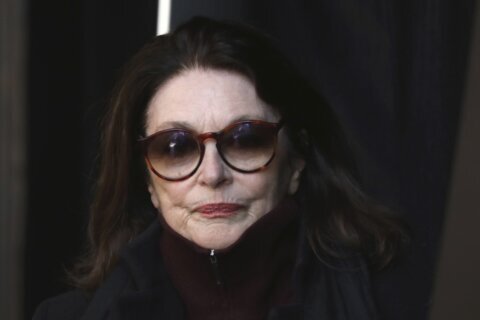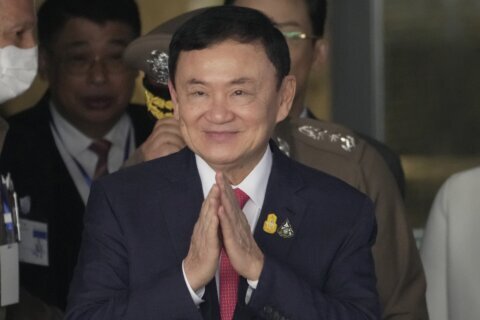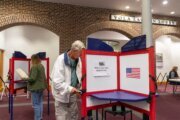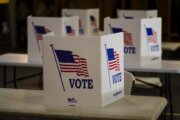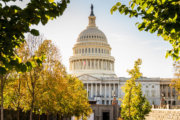LONDON (AP) — A former chief justice of the Supreme Court of Canada is stepping down from Hong Kong’s top court, city officials said Monday, the latest overseas judge to resign from the court amid concerns about judicial independence.
Hong Kong’s judiciary confirmed said Beverly McLachlin will complete her term as a non-permanent overseas judge at Hong Kong’s Court of Final Appeal, without giving more details.
Canadian media outlets reported McLachlin noted in her statement that she has reached 80 years of age and will retire from that position when her term ends in July. She said she intended to spend more time with her family and she continues to have confidence in the members of the court and their independence, the reports said.
Also Monday, a British judge who resigned from the same court last week said he stepped down because the rule of law in the city is in “grave danger” and judges operate in an “impossible political environment created by China.”
Jonathan Sumption, who had served as a non-permanent overseas judge on Hong Kong’s Court of Final Appeal, described a growing “paranoia of the authorities” and judges being intimidated by a “darkening political mood” in the Asian financial hub in an article published by the Financial Times on Monday.
“Hong Kong, once a vibrant and politically diverse community, is slowly becoming a totalitarian state. The rule of law is profoundly compromised in any area about which the government feels strongly,” he wrote. “The least sign of dissent is treated as a call for revolution.”
He wrote that he remained on the court in the hope that the presence of overseas judges would help sustain the rule of law, but “I fear that this is no longer realistic.”
McLachlin and Sumption were the latest of several overseas judges who have quit Hong Kong’s highest court in recent years.
Hong Kong, a former British colony, is a common law jurisdiction, unlike mainland China. After the city returned to Chinese rule in 1997, non-permanent overseas judges have consistently served on its top court. Fifteen such judges served in 2019. About seven remain following McLachlin’s departure next month.
The city government expressed its strong disagreement with Sumption’s comments in a lengthy statement Tuesday. It insisted the city’s courts are not under any political pressure from Chinese authorities or the local government when handling cases, and said the rule of law in the financial hub has not declined.
Andrew Cheung, chief justice of the city’s top court, said in a statement that any suggestion that judicial decisions has or could be compromised is a serious allegation and should not be lightly made. He said there is tension between protecting fundamental rights and safeguarding national security, but the city’s judiciary is committed to both causes.
“It is one thing to disagree with a court’s decision, but it is quite another to suggest that fundamental rights have been compromised because of political concerns,” he said.
Hong Kong’s leader, John Lee, doubled down in his weekly news briefing, saying the professional duty of judges is to interpret and apply law in accordance with legal principles and evidence, regardless of their political views about a certain law.
Lee said Sumption in 2021 wrote about people’s confusion between democracy and the rule of law and his latest statement appears to be contradictory to his previous stance.
Lee also said some British officials and politicians have attempted to “weaponize” the U.K. judicial influence to target China and Hong Kong and the city should not allow that.
“It is sad and disappointing that our judges are abandoned by a few overseas counterparts and have been so unfairly treated,” he said.
In 2022 another British judge, Robert Reed, stepped down while saying the administration “has departed from values of political freedom, and freedom of expression.”
Another judge, Lawrence Collins, resigned last week, telling The Associated Press that his departure was “because of the political situation in Hong Kong. But he said he continues “to have the fullest confidence in the court and the total independence of its members.”
Rights groups and critics say Chinese authorities’ enactment of a 2020 national security law has eroded Hong Kong’s judicial independence and all but wiped out public dissent. Many pro-democracy activists have been arrested under the law.
In May, a Hong Kong court found 14 pro-democracy activists guilty of conspiring to commit subversion in the city’s biggest national security case to date. They were among 47 activists accused of attempting to paralyze Hong Kong’s government and topple the city’s leader by securing the legislative majority necessary to indiscriminately veto budgets.
The Beijing and Hong Kong governments have insisted that the law has helped bring back stability following huge anti-government protests in 2019.
Copyright © 2024 The Associated Press. All rights reserved. This material may not be published, broadcast, written or redistributed.

